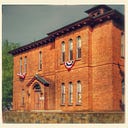John Deane, 1639–1717:
The First English Child Born in Taunton
By William F. Hanna
The oldest cemetery in Taunton is located on the easterly side of Summer Street, a short walk from the OCHM. It takes its name from the Neck o’ Land, the quarter mile piece of territory leading downhill from the old Puritan meetinghouse to the confluence of the Taunton and Mill Rivers. Although the cemetery has suffered from centuries of neglect, the tombstones of a few of the early settlers are still visible. Among them is the grave of John Deane, whose birth in 1639 brought him recognition as the first English child born in Taunton.
Young John grew up among the founders of the town. His father, also named John, had come to America in his mid-thirties. Leaving behind a large family, he was accompanied only by his younger brother Walter and sister Margaret. The three had forgone the comfort of South Chard, Somersetshire, England and become part of a tightly knit group of Puritan first comers that included Elizabeth Pole and her brother William. After crossing the ocean and staying for a while in Dorchester, they and the others trudged thirty miles through the wilderness to settle Taunton, anchoring the western edge of the Plymouth Colony.
It’s unclear when and where the elder John Deane married, and all we know of his wife is that her given name was Alice. The couple raised four sons and named the first, born in 1639, after his father. When the elder Deane died in 1660, he took his place in Taunton history as a pillar of both the civic and religious life of the community.
John Deane the younger was raised on the family farm sited on the west side of the Taunton River on present-day Dean Street. In olden times this was a cart path known simply as “the old way.” The original Deane homestead was located between the site of today’s Longmeadow Nursing Home and the present-day corner of Longmeadow Road.
In 1663, John married Sarah Edson, of Bridgewater. They were unusually lucky, for over the next twenty-five years Sarah gave birth to nine children, all but one of whom lived to adulthood. Life on the frontier meant backbreaking work and frequent danger, and the Deanes saw their share of both. When King Philip’s War broke out in the spring of 1675, for example, the Deanes had five children ranging in age from 9-year old Samuel to 3-month old Elizabeth. While it’s likely that Sarah and the children sought the safety of the garrison house built near the center of town, it’s also probable that John stayed close to the farm caring for the animals and tending his crops, as much as he dared to do so.
The life of a seventeenth and eighteenth-century subsistence farmer was challenging, but John followed in his father’s footsteps and took his place as a respected member of the town. The Deanes upheld the family’s traditional loyalty to the Taunton church, and John’s eldest son, Samuel, became one of its deacons. As the first generation of Taunton settlers gave way to the second and then the third, the Deane family continued to play an important role in the town’s growth.
Taunton’s first-born English child lived a long life, surrounded by his children and grandchildren. He died during the “Great Snow” of February 1717, at the age of 77 years. So deep was the snow that his body laid in the house for two weeks before neighbors could be summoned. Reverend Samuel Hopkins Emery, writing in 1853, recounted an old story that had been passed down in the Deane family. It seems that in his final illness his unmarried daughter, Elizabeth, was caring for the old man. Let Emery tell it:
“She had been remarkably timid up to this time. But during these many days of solitary confinement with the dead body of her father, she experienced such a change in her character, as excluded all fear forever after. She was famous through all the region for her resolute and undaunted courage.”
When the weather cleared, family and friends carried the old man’s coffin over the muddy road down to Neck o’ Land and buried his body with those of the many first-comers he had known so well. His humble gravestone, which has somehow survived the ravages of three centuries, makes no mention of his status as Taunton’s first-born white child. Instead, as if in a hurry, it reduces his long, productive life to just four lines:
HERE LISE THE BODY OF
JOHN DEANE AGED 77
DIED IN THE YEAR 1717 FEBRUARY
THE 18
